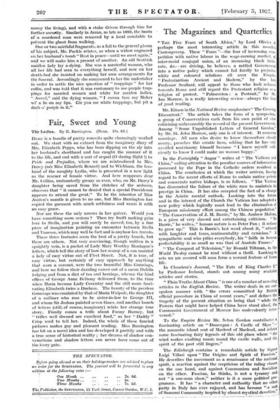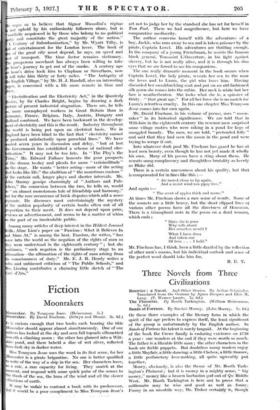- The Magazines and Quarterlies
"Tan Five Fears of South Africa," by Lord Olivier, perhaps the most interesting article in this Month's Contemporary. These "Fears "—the fear of increasing corn. petition with native labour in the wage-earning market, of inter-racial conjugal union, of an increasing black birth. rate, &c.—are driving, he believes, a rattled Government into a native policy which cannot fail fatally to prejudice white and coloured relations all over the Empire, "Protestantism Ancient and Modern," by the late, Professor Scullard, will appeal to those who look askaneet towards Rome and still regard the Protestant religion as & religion of protest. "Palmerston : . a Portrait," by Mr. Ian Morrow, is a really interesting review—always the best of good reading.
Mi. Kitson in the National Review emphasizes" The Crowing Discontent." The article takes the form of a symposium, a group of Conservatives each from his own point of view criticizing unfavourably the record of the present Government. Among - " Some Unpublished Letters of General Gordon," by Mr. St. John Morrow, only one is of interest. It concern marriage. All men who desire to know themselves should marry, preaches this erratic hero, adding that he has only avoided matrimony himself because "I knew myself stitl. deafly to know I could make no Woman happy."
• In the Fortnigldly " Augur" writes of "The Vatican and China," calling attention to the peculiar sources of information possessed by the Pope in the Catholic orders resident in China. The conclusion at which the writer arrives, having regard to the recent efforts of Rome to ordain native priests and consecrate native bishops, is as follows. "The Vatican has discounted the failure of the white race to maintain its prestige in China. It has also accepted the fact of a change in the Asiatic mental outlook. Looking into the future and in the interest of the Church the Vatican has adopted a new policy which logically must lead to the elimination of European missionary effort among the Chinese population." "The Conservatism of J. M. Bane," by Mr. Andrew Malone, is a piece of very shrewd and entertaining criticism. 'To Barrie," he writes, "human nature is as Peter Pan ; it refusei to grow up." This is Bank's last word about it, "uttered with laughter and tears, sentimentality and cynicism." A sympathetic soul who pities everybody, his "faith in human perfectability- is as small as was that of Anatole France."
'The Conquest of Television," by Ronald Tiltman, in the World To-day cannot be read without a thrill. Looking-in sets we are assured will soon form a normal feature of home life.
In Chambers's Journal, "The Fate of King Charles L" by Professor Ireland, stands out among many readable articles and stories.
"Plain Truths About China "is one of a number of arresting articles in the English Review. The writer deals in an out- spoken manner with "the errors committed by British official procedure in China of recent years," and defines the tragedy of the present situation as being that "while the Powers that might have helped China have stood aloof, the Communist Government of Moscow has malevolently inter-' vened."
• To the Empire Review Mr. Seton Gordon contributes a fascinating article on " Dunveg,an : A Castle of Skye
the romantic island seat of Macleod of Macleod, and relate', some fascinating fairy legends of this old place where "the' wind makes exulting music round the castle walls, and the spirit of the past still lingers."
The Edinburgh contains a remarkable article by Signor: Luigi Villari upon "The Origins and Spirit of Fascism." He describes the Movement as a renaissance of the national spirit, a reaction against the scepticism of the ruling classes - on the one hand, and against Communism and Socialism on the other. Fascism, he thinks, is not a tyranny and not "'a one-man sho*," neither is it a mere political pnrr gramme. It has "a ,character and authority that no other party in Italy has ever enjoyed, and has become "11 Sol of Samurai Community inspired by almost mystical devotion...; c urges us to -believe that Signor Mussolini's regime not upheld by: his enthusiastic followers alone, but is t cordially acquiesced in by those who belong to no political I'lsty and constitute the great Majority - of the nation." A Century of Suburbanization," by Mr. Wyatt Tilby, is II of entertainment for the London lover. The limit o-f of the great city must depend, he says, on speed and of transport. The time factor remains stationary. le prosperous merchant has always been willing to take hour's journey to get out of the smoke. A century ago hour's drive took him to Clapham or Streatham, now will take him thirty or forty miles. "The Antiquity of w English Village," by Mr. H. J. Randall, also an interesting iper, is concerned with a life more remote in time and ace.
'Electrification and the Electricity Act," in the Quarterly (WM, by Sir Charles Bright, begins by drawing a dark lam of present industrial stagnation. There are, he tells
• , more unemployed workers in Great Britain than in ermany, France, Belgium, Italy, Austria, Hungary and lolland combined. We have been backward in the develop- ent of electricity and this is the result. Industry throughout le world is being put upon an electrical basis. We in ngland have been blind to the fact that "electricity cannot , produced satisfactorily upon parochial lines." We have -asted seven years in discussion and delay, "but at last ie Government has established a scheme of national eke- 1
' lineation." It may not be too. late. In "The Play's the hing," Mr. Edward Falkner laments the poor prospects of the drama to-day and pleads for more " verisimilitude " On the stage. He wants "better acting—more of the acting
Ilat looks like life," the abolition of" the monstrous custom" I the curtain call, longer plays and shorter intervals. Mr. elm Murray gossips charmingly of "Authors and Pub- 'shers," the connexion between the two, he tells us, would be "an almost monotonous tale of friendship and harmony," hilt for the rare occurrence of brisk disputes which add a sauce ignante. He discusses most entertainingly the mystery f the sudden popularity of certain books often out of all roportion to their merit. It does not depend upon price, views or advertisement, and seems to be a matter of whim n the part of an incalculable public.
Among many articles of deep interest in the Ilibbert Journal Mlle. Aline Lion's paper on " FaSeism : What it Believes In ad Aims At," is among the best. Fascism, she writes, "has Inc into the world as the negation of the rights of man as icy were understood in the eighteenth century " ; but she nitinues, "such negation is the preliminary stage to an Ilirmation—the animation of the rights of man arising from is consciousness of duty." Mr. F. J. R. Hendy writes a dm and unbiassed criticism of "The Public Schools," and rs. Liveing contributes a charming little sketch of "The ure d'Ars."
st



























































 Previous page
Previous page